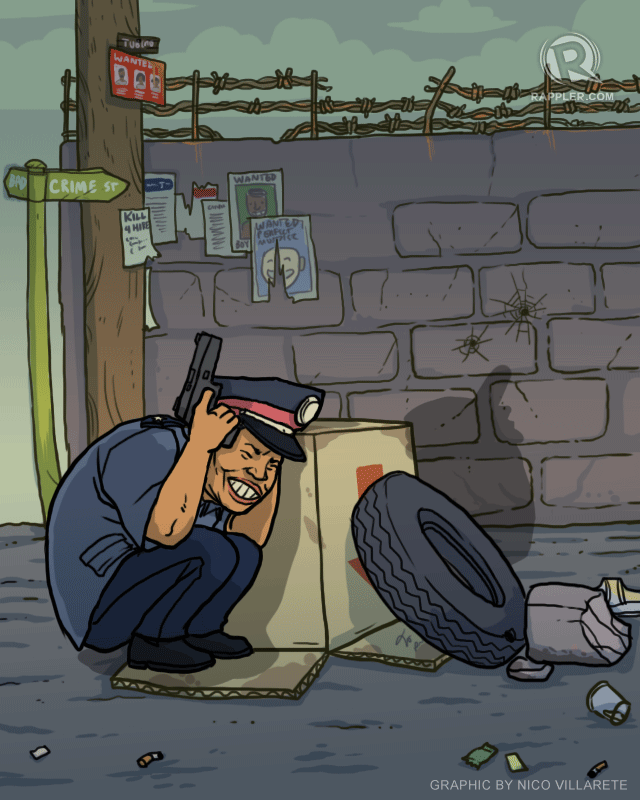SUMMARY
This is AI generated summarization, which may have errors. For context, always refer to the full article.

It is not every day that we are witness to a crime. But when it happens, we are reminded of a cycle that comes every 3 years under any Philippine presidency. Upon assuming office, the President enjoys relative peace even in streets ruled by thugs. This gives him and his favored police chiefs room to do less urgent matters – such as reward loyalists with plum positions in the Philippine National Police (PNP), award cops with plaques and merit citations, create task forces for “special” crimes, find the budget to buy guns and police cars, raise money to renovate the PNP chief’s “White House,” among others.
And then it happens in mid-term – as it did without fail since the Philippine National Police (PNP) was formed in 1991 when the Philippine Constabulary merged with the Integrated National Police. Criminals get more brazen. Cops are booked for crimes they’re supposed to end. Guns are fired in broad daylight. The PNP leadership realizes soon enough what every previous PNP leader had known all along: there are too many cops sitting behind their desks; there are too many agencies screening police recruits; and there are too many loopholes in the system of disciplining scalawags. One sits on these problems at one’s peril.
The problem with crime in this country is not simply the criminals. The problem with crime largely lies in the people tasked to put an end to it.
Surprisingly, President Benigno Aquino III sees a silver lining to this. In defending his former security aide, now PNP chief Alan Purisima, from resignation calls, the President said that, yes, policemen have been involved in crimes, but who caught them in the first place? It’s the PNP under Purisima, Aquino stressed. “It’s true there are rogue cops, but who caught those that extorted in EDSA? They were policemen, too,” the President said. “Through the leadership of General Purisima, it was fellow policemen who investigated, pursued, caught, and filed a case against them.”
Well, not exactly. The incident wherein cops from the La Loma police station pointed guns at hapless businessmen on EDSA and stole money from them was exposed not by the PNP but by one citizen who took a photo of the daylight extortion and posted it on social media. Without that photo, we are certain the scalawags could have gotten away with it. We can cite another example: the mauling of entertainer Vhong Navarro in a sensational case that prompted the PNP to review its rules covering policemen in charge of blotters at police stations. Without media focus on the scandal, we would not have confirmed our worst fears that blotters can indeed be easily manipulated.
We can cite many other examples that will remind the President and his uniformed underlings that a vigilant public is the best antidote to crime. But what would make a citizen take one step to compromise his peaceful routine or risk his own life, just to fight crime and keep his community safe? Simple: he has to know and he has to trust that his effort will be worth it.
That’s when the PNP comes in – how it’s led, how it’s managed, and how it strives to fulfill its mandate to keep citizens, families, and communities safe.
The corrupt and incompetent in its ranks have been there for the longest time. This is old news that no amount of pretty crime statistics can mask. The latest example, in fact, is in that viral EDSA “huli-dap” incident too. Two of the suspects were involved in the same modus 3 years back, but they have yet to be dismissed from service because it’s been taking highers-up too long to sign the papers.
The challenge is not so much to catch erring cops as to create the environment where they won’t thrive. Because they will thrive in places where the rules are not clear, where promotions can be bought, where pay is low but the generals rake it in, where resources are scarce but vanity projects arise. They will thrive where their leaders squabble and fight over turf, where their PNP chief keeps his own coterie of loyal officers while their secretary of the interior builds his own. They will thrive when they are made to serve two masters who see things differently and who set up parallel chains of command that sometimes bark conflicting orders.
That’s the unspoken problem that the PNP faces today. And it’s an unspoken problem that no one would dare tell the President. When leadership fails, public vigilance becomes the biggest casualty. And crime stays. – Rappler.com
Add a comment
How does this make you feel?
There are no comments yet. Add your comment to start the conversation.